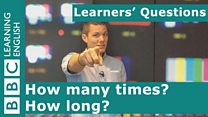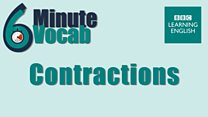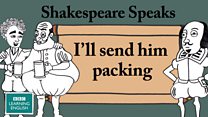Unit 13: English You Need
Exams, news, pronunciation, teachers' tips, learners' questions
Select a unit
- 1 English You Need
- 2 English You Need
- 3 English You Need
- 4 English You Need
- 5 English You Need
- 6 English You Need
- 7 English You Need
- 8 English You Need
- 9 English You Need
- 10 English You Need
- 11 English You Need
- 12 English You Need
- 13 English You Need
- 14 English You Need
- 15 English You Need
- 16 English You Need
- 17 English You Need
- 18 English You Need
- 19 English You Need
- 20 English You Need
- 21 English You Need
- 22 English You Need
- 23 English You Need
- 24 English You Need
- 25 English You Need
- 26 English You Need
- 27 English You Need
- 28 English You Need
- 29 English You Need
- 30 English You Need
Session 5
Learners' Questions
Welcome to Learners' Questions - the series where we answer your queries about the English language. What will this week's learner question be?
Activity 1
Learners' Questions
Gonna, wanna, gotta
Daniel in Argentina says: under what circumstances do we use wanna and gonna? And what do they mean?
Watch the video and complete the activity

Dan
Hi guys! Dan for BBC Learning English here with this week's Learner Question. Find out what it is after this.
OK! This week's learner question comes from Daniel. Daniel! Hey, buddy! Daniel, Daniel. Hey! Daniel in Argentina. He says, I would like to know please under what circumstances we should use wanna and gonna, and what exactly they mean.
Well, it's a good question, Daniel. These expressions are extremely common in informal speech, especially in American English. It’s important that you are able to recognise and understand them, but you probably won’t need to use them and you shouldn’t write them down. You should always write the extended form.
Gonna is a form of going to, and like going to it can be used for future predictions and future plans. It can be accompanied by the be verb, or not. And, it’s more common to omit the verb in 2nd person singular and plural sentences. For example, what you gonna do now? I’m gonna sit down and relax.
Wanna can be used with all singular and plural pronouns, except in the 3rd person – that’s he or she. We still need to use the ‘s’ with the verb in these cases. It means want to. I want to becomes I wanna. Again, the auxiliary verb here in the question can be omitted. For example, what you wanna do now? I wanna go home. My father wants us to have dinner.
Gotta is another example of condensed language. It comes from have got to. And it’s much less common in question forms, but when it does appear in a question, the have can be omitted. For example, what you gotta do this evening? I’m not sure. I gotta phone home and find out.
I hope that answers your question, Daniel. Thank you very much for writing to us. If anybody else out there has a question for Learners’ Questions, you can email us on: learning.english@bbc.co.uk. Please remember to include Learners’ Questions in the subject box and your name and where you’re writing from. We can’t possibly answer all the questions, guys, we’re very sorry. We just get too many, but we do read every single one. And for more information, go to our website: bbclearningenglish.com. That’s it for this week’s Learners’ Questions. Thank you very much for tuning in. I’ll see you next time. Bye.
___________________________________________________________________
Did you like that? Why not try these?


 _______________________________________________________________________________________
_______________________________________________________________________________________
Summary
Informal
These expressions are extremely common in informal speech, especially in American English. It’s important that you are able to recognise and understand them, but you probably won’t need to use them and you shouldn’t write them down. You should always write the extended form.
Gonna
Gonna is a form of going to, and can be used for future predictions and future plans. It can be accompanied by the be verb, or not. And, it’s more common to omit the verb in 2nd person singular and plural sentences.
What you gonna do now? I’m gonna sit down and relax.
Wanna means want to, and can be used with all singular and plural pronouns, except in the 3rd person (he, she or it). We still need to use the ‘s’ with the verb in these cases. Again, the auxiliary verb here in the question can be omitted.
What you wanna do now? I wanna go home. My father wants us to have dinner.
Gotta is another example . It comes from have got to. And it’s much less common in question forms, but when it does appear in a question, the have can be omitted.
What you gotta do this evening? I’m not sure. I gotta phone home and find out.
To do
Try our quiz to see what you've learned about this topic.
Learners’ Questions Quiz
4 Questions
Decide if these sentences are correct or incorrect
Help
Activity
Decide if these sentences are correct or incorrect
Hint
Gonna means 'going to'. Can you use 'going to' here?Question 1 of 4
Help
Activity
Decide if these sentences are correct or incorrect
Hint
Can we use wanna in the 3rd person (he, she and it)?Question 2 of 4
Help
Activity
Decide if these sentences are correct or incorrect
Hint
This looks like a piece of writing - probably a formal one. Can we use this type of language formally?Question 3 of 4
Help
Activity
Decide if these sentences are correct or incorrect
Hint
Gotta is a form of 'have got to' - when we make a question with 'have got to', which verb do we begin the question with?Question 4 of 4
Excellent! Great job! Bad luck! You scored:
End of Session 5
Well, that's it for this unit! Join us again in Unit 14 for more Exam Skills, News Review, Pronunciation in the News, The Teachers' Room and Learners' Questions!
Session Vocabulary
Gonna
Gonna means going to
What you gonna do now? I’m gonna sit down and relax.Wanna means want to.
What you wanna do now? I wanna go home.Gotta means have got to.
What you gotta do this evening? I’m not sure. I gotta phone home and find out.